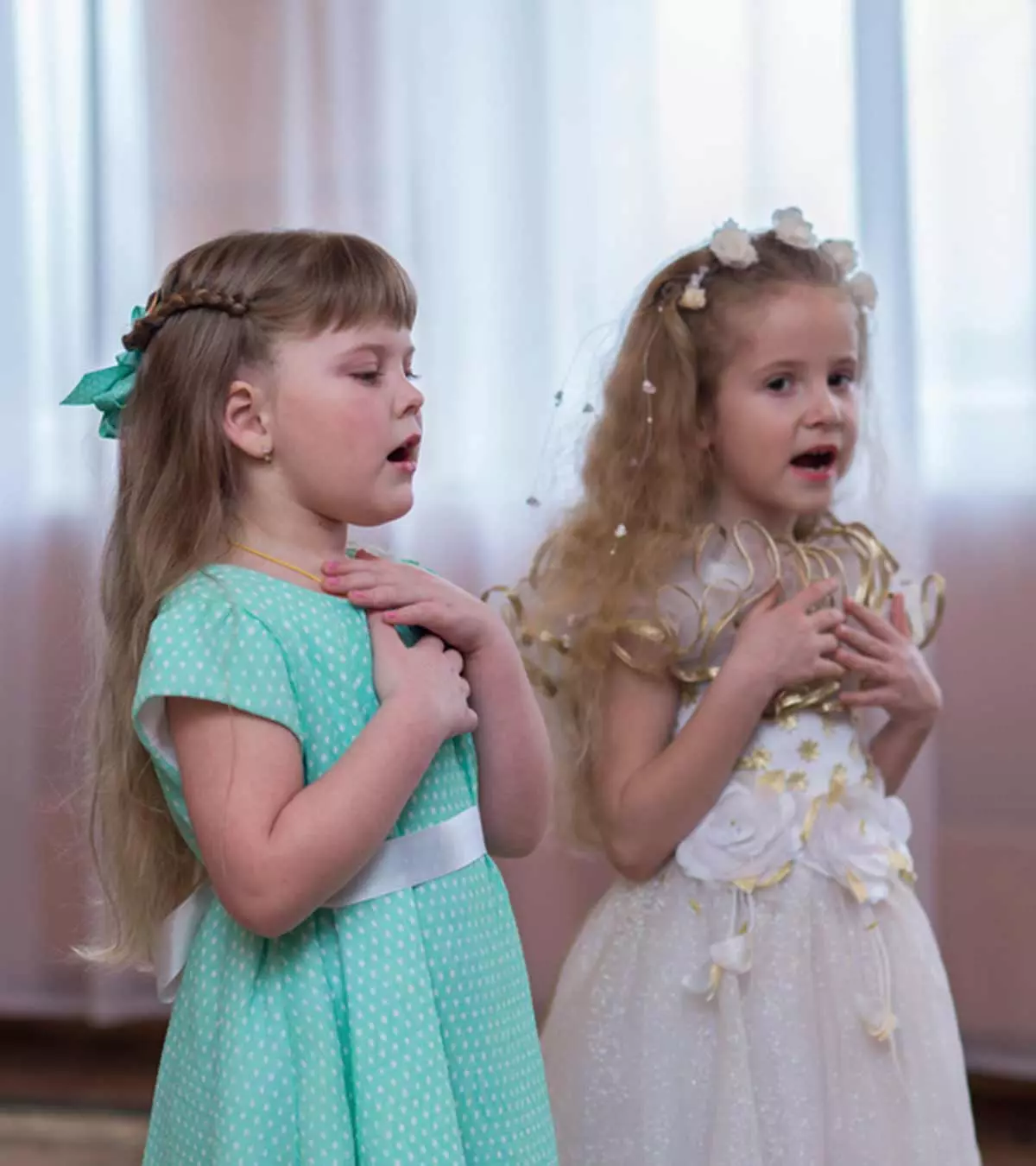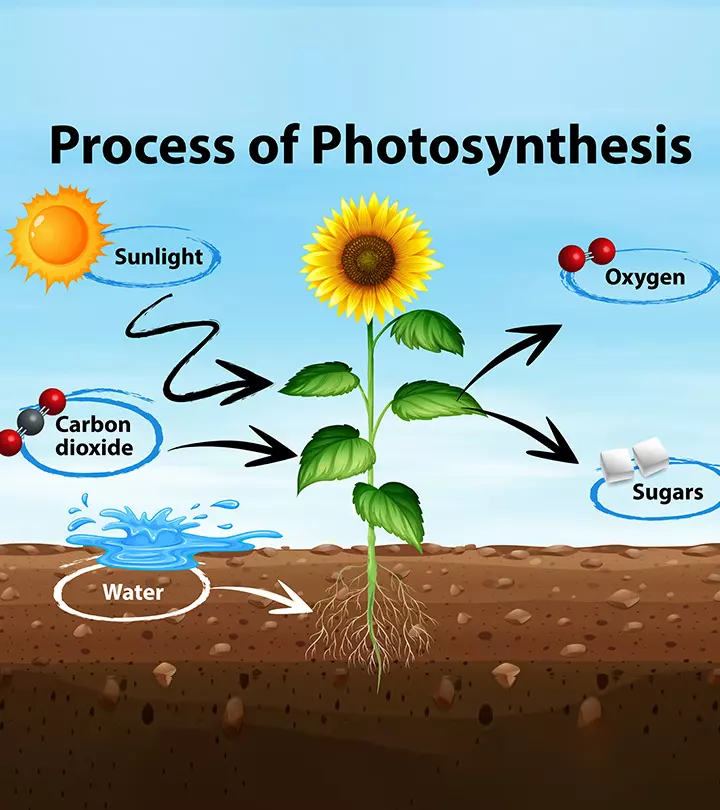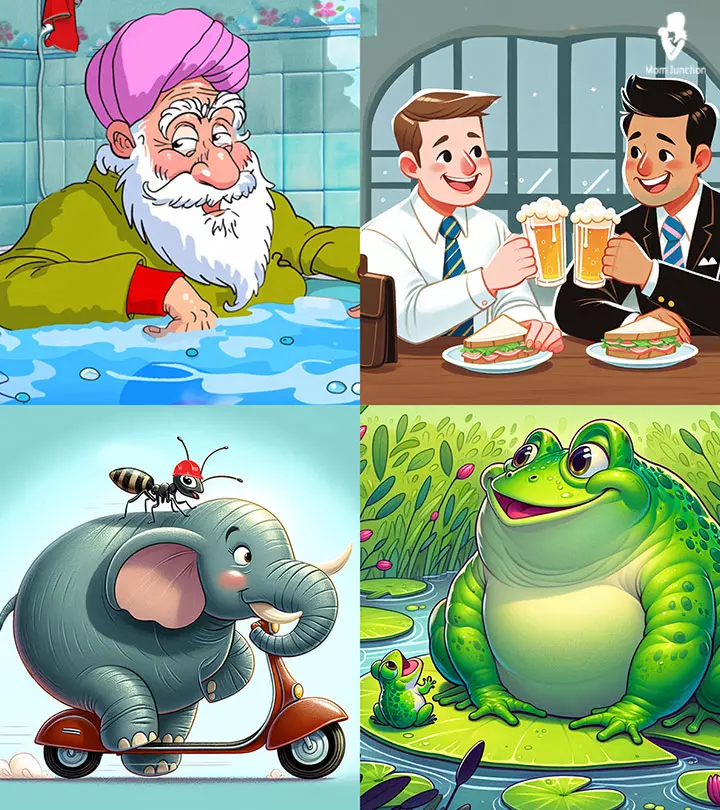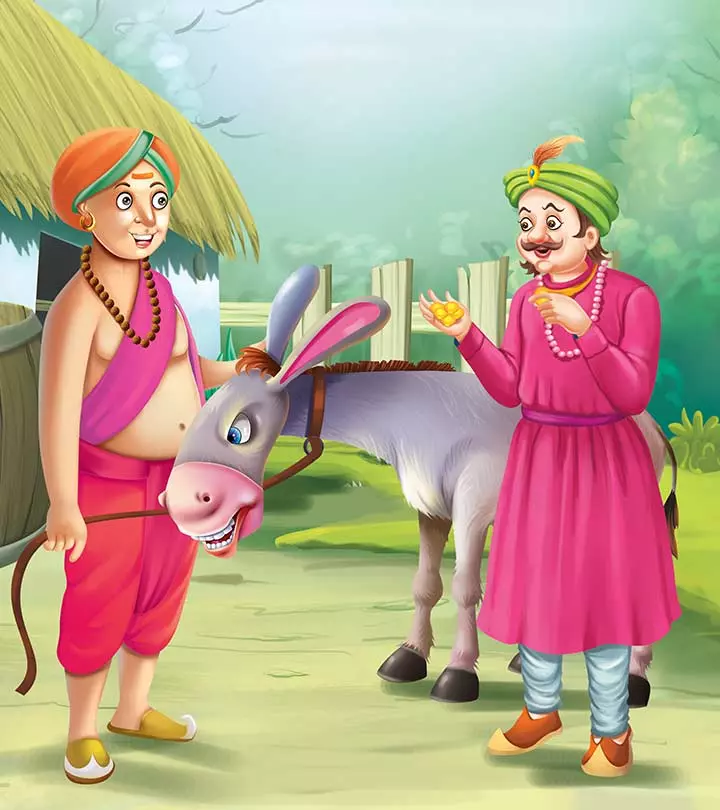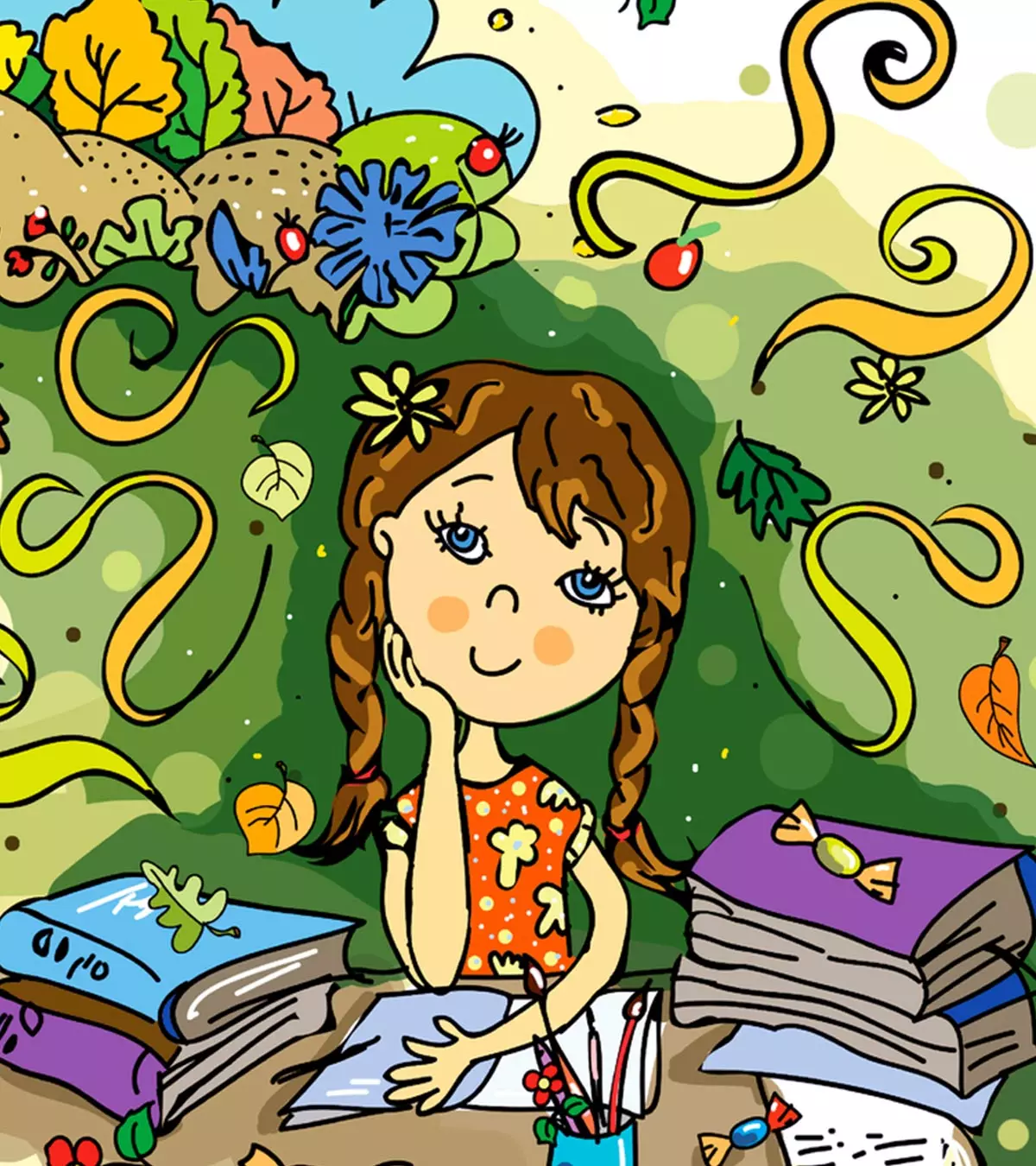
Image: Shutterstock
Introducing acrostic poems for kids is one of the simplest ways to inspire them to appreciate poetry. This form of poetry gives children the freedom to write small unique poems. As a result, they can be creative with their words during the writing process without worrying about their rhyme scheme. Also, acrostic poems enhance children’s vocabulary and imagination and refine their writing skills. This post elaborates on acrostics and provides examples of such poems for children.
What Is An Acrostic?

Image: IStock
An acrostic can be defined as a simple section of writing in which the first letter of the line, word, or paragraph spells a name or phrase with a special significance to the given context. Acrostics are often written vertically in poetry style, but some people like to use them in prose or word puzzles.
The most common type of acrostic is formed by using the first letters of each line. Apart from this, we can experiment by keeping the letters in different positions. When placed elsewhere in a line apart from vertical, it forms a hidden code.
The word that is usually spelled out in an acrostic is termed ‘acrostich.’ It carries a specific meaning in the content—could be the poem’s subject or its author. Acrostic poems are usually free verses with or without rhyme. Hence they are easy for children to learn. Incorporating rhyming poems for kids adds an element of playfulness, encouraging them to enjoy poetry even more. Also, every line can be as long or short as you want.
How Do You Teach An Acrostic Poem?

Image: IStock
Here are a few simple steps to follow for creating an acrostic poem.
- First, you need to decide the topic.
- Write down the word vertically in upper case letters.
- Think of words and phrases that describe your idea with precision. The words can be nouns, adjectives, verbs, or adverbs that depend on the child’s thinking ability.
- Now, choose the words or phrases that fit in the given context and place them appropriately.
- Next, fill in the rest of the lines to create your poem.
- As an optional step, children can also illustrate their ideas or concepts.
- Lastly, the words’ length depends on the children’s age and their comfort in creating a poem. For example, younger children prefer to write an acrostic poem with three or four-letter words, whereas older ones might prefer to write more lines.
 Do remember
Do rememberAlexis, a teacher, shares how she teaches acrostic poems in an interesting way to her students. She says, My kids are always able to quickly create these poems from their schema. It’s a no-hassle, fun way to introduce a simple form of poetry. We begin our lesson by creating one together for the word Fall. I had students turn and talk with a partner to come up with ideas and be successful. We voted on the best sentences that fit our theme.
“After our practice together, I sent them off with the word Pumpkin. They were hard at work creating meaningful and descriptive sentences about Autumn time. I was there with post-its to help them with their editing, including spelling and making sense of the words (i).”
10 Acrostics Poems For Kids
Let us go through a few simple acrostic poems that you can teach your children.
1. An Acrostic
Elizabeth, it is in vain you say
‘Love not’ — thou sayest it in so sweet a way:
In vain those words from thee or L. E. L.
Zantippe’s talents had enforced so well:
Ah! If that language from the heart arise,
Breathe it less gently forth — and veil thine eyes.
Endymion, recollect when Luna tried.
To cure his love — was cured of all beside —
His folly — pride — and passion — for he died.
—Edgar Allan Poe
2. Acrostic: Georgiana Augusta Keats
Give me your patience, sister, while I frame
Exact in capitals your golden name;
Or sue the fair Apollo, and he will
Rouse from his heavy slumber and instill
Great love in me for thee and Poesy.
Imagine not that greatest mastery.
And kingdom over all the Realms of verse,
Nears more to heaven in aught than when we nurse
And surety give to love and Brotherhood.
Anthropophagi in Othello’s mood;
Ulysses storm’d and his enchanted belt.
Glow with the Muse, but they are never felt.
Unbosom’d so and so eternal made,
Such tender incense in their laurel shade
To all the regent sisters of the Nine
As this poor offering to you, sister mine.
Kind sister! Aye, this third name says you are;
Enchanted has it been the Lord knows where;
And may it taste to you like good old wine,
Take you to real happiness and give
Sons, daughters, and a home-like honied hive.
—John Keats
 Did you know?
Did you know?3. Acrostic: Little Maidens, When You look

Image: Shutterstock
Little maidens, when you look.
On this little story-book,
Reading with attentive eye.
Its enticing history,
Never think that hours of play.
Are your only HOLIDAY,
And that in a HOUSE of joy.
Lessons serve but to annoy:
If in any HOUSE you find
Children of a gentle mind,
Each the others pleasing ever–
Each the others vexing never–
Daily work and pastime daily
In their order taking gaily–
Then be very sure that they
Have a life of HOLIDAY.
—Lewis Carroll
4. Another Acrostic ( In The Style Of Father William )
“Are you deaf, Father William!” the young man said,
“Did you hear what I told you just now?
“Excuse me for shouting! Don’t waggle your head.
“Like a blundering, sleepy old cow!
“A little maid dwelling in Wallington Town,
“Is my friend, so I beg to remark:
“Do you think she’d be pleased if a book were sent down
“Entitled ‘The Hunt of the Snark?’”
“Pack it up in brown paper!” the old man cried,
“And seal it with olive-and-dove.
“I command you to do it!” he added with pride,
“Nor forget, my good fellow, to send her beside.
“Easter Greetings, and give her my love.”
—Lewis Carroll
5. The Universe (An Acrostic)

Image: Shutterstock
~Sun~
Super bright
Ultralight
Never night
~Moon~
Mostly seen
On days in between
Only the new and
Not often blue
~Stars~
Shining in the sky
Twinkling bright in my eye
Always glowing like a Firefly.
Radiating splendor from high
Shining sparkles never die.
—Theodora (Theo) Onken
6. Acrostic Poems
Earthquakes:
E-arth shudders on its hinge
A-ll experience that terrific punch
R-oads crack and traffic stops
T-remors rock, and havoc wreaks
H-orror strikes and rubble heaps
Q-uest to save the trapped turns in vain
U-nder the rubble, men scream in pain
A-fter shocks and seismic waves
K-illing thousands, the disaster leaves
E-ngulfing gloom swallows the Earth
S-ky high dreams, shattered in death
Ghost:
G-hastly noises heard around.
H-aunted houses with thickets surround
O-ld castles where mysteries abound
S-tarved faces greatly confound
T-errible bats worse than hounds
Storm:
S-trong and swift the wind blows
T-wirling and twisting delicate blooms
O-rchards strewn with fruits- ripe n’ raw
R-ain and thunder snarl and growl
M-aking the sea suddenly shriek and howl
—Valsa George
7. Acrostic (Environment)
Everyone should care
No one should ignore a world so
Vital and green
Inviting and teeming with life. Mother earth
Revolves around our respect, how we take
Ownership of our actions; and
Never forget our inheritance. We must
Mind our responsibility and pass along
Every moment of beauty bestowed upon us
Nurture a green future for our children, and
Try to preserve Mother Nature’s gift to us all.
—Carolyn Brunelle
8. Water (Acrostic)
Water is my favorite drink,
At times the best thing to quench a thirst.
That comes to me suddenly,
Even though it’s abundantly available
Refined, pure specimens are sold in shops.
—Gert Strydom
9. Acrostic (Science)
S-earching and
c-ollecting data
I-n many varied ways to
e-xplore
n-ature’s
c-hemistry and
e-mpirically test the physical world around us.
—Carolyn Brunelle
10. Homework (Acrostic)

Image: Shutterstock
Homework is such a bore
Others never do it
My parents make me
Everyday I get a ton
Way too much to get done
Occasionally I have none
Really though, I’ll get the teachers back
Knock some sense into them
—Janneke Tenvoorde
Are you tired of always chasing the one you wish for? Fret not, these psychological tricks will surely make her chase you. Discover the secrets to make her want you like never before.
Illustration: Examples Of Acrostic Poems For Kids
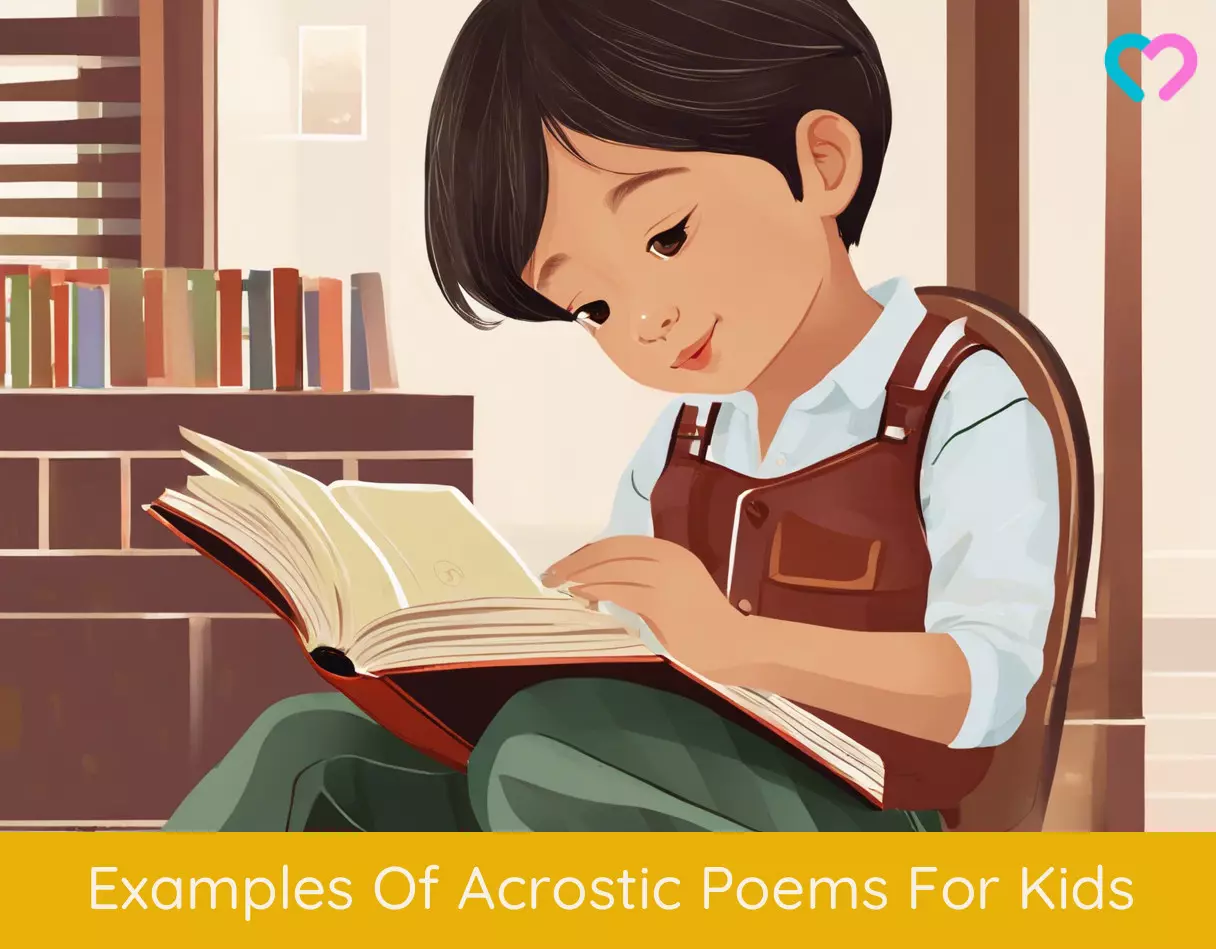
Image: Stable Diffusion/MomJunction Design Team
Frequently Asked Questions
1. How many lines does an acrostic poem have?
An acrostic poem does not have any set number of lines or phrases. The writer can add up to as many lines as they want to.
2. What is the subject of an acrostic poem?
The main subject of an acrostic poem is, in most cases, the first letters of each line that is spelled out. The main idea is then summarized in the vertical lines of the poem (1).
3. Are there any age restrictions when writing acrostic poems for children?
There are no age restrictions for writing acrostic poems, and children of all ages can try it. However, ensure to choose age-appropriate concepts and words. Young children can experiment with simple acrostic poems with a single-word prompt, while older children can explore various emotions and more complex concepts through this poetry.
4. What are some interactive activities to get kids interested in acrostic poems?
You can engage kids by letting them write acrostic poems based on their favorite colors, food, animals, etc. Encourage them to have group discussions where they can share their poems and give feedback to each other. This will get them more interested in the process of writing poems.
5. What are some of the best themes for acrostic poems?
For kids, ‘Summer,’ ‘Favorite color,’ ‘Friendship,’ ‘Dreams,’ ‘Favorite Food,’ ‘My Parents,’ ‘Animals,’ ‘Fairy Tales,’ and ‘Christmas,’ can be interesting topics for writing acrostic poems. These themes involve subjects that match their interests and experiences.
6. What are some tips for writing acrostic poems with kids?
To write acrostic poems with kids, encourage them to come up with themes or topics they want to write about. You can help them by suggesting some and brainstorming with them to find words related to their chosen theme. Use fun and simple language and let them doodle or illustrate their poems to make it even more fun. You can also inspire them with ideas from children’s books or shows.
Introducing acrostic poems for kids is a great way to help them appreciate literature in all its forms. Poetry is a beautiful way of expression, and knowing its different styles will help enhance children’s imagination. So, encourage them to use acrostic poems to write about anything that holds their fancy. The poems mentioned in this article will give them an idea about how to begin writing. As they go through the poems and tap into their creativity, they will soon start articulating their unique poetry.
Personal Experience: Source
MomJunction articles include first-hand experiences to provide you with better insights through real-life narratives. Here are the sources of personal accounts referenced in this article.
i. Fall acrostic poems.https://laugheatlearn.com/fall-acrostic-poems/
References
- What Is an Acrostic Poem?
https://wonderopolis.org/index.php/wonder/what-is-an-acrostic-poem
Community Experiences
Join the conversation and become a part of our nurturing community! Share your stories, experiences, and insights to connect with fellow parents.
Read full bio of Vinita Agrawal
Read full bio of Sravani Rebbapragada
Read full bio of Harshita Makvana
Read full bio of Benidamika J Latam







